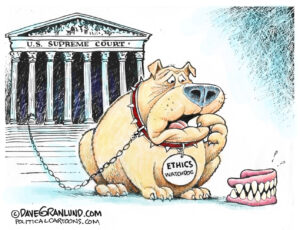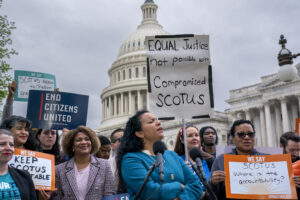Major Cases of the Supreme Court’s 2022 Term
The court is now firmly controlled by an emboldened super-majority of right-wing politicians dressed in black robes. These are the cases where they likely will do the most damage this term. Members of the Supreme Court sit for a new group portrait following the addition of Associate Justice Ketanji Brown Jackson. Photo: J. Scott Applewhite / AP.
This is Part of the "The Supreme Court’s War on the Future" Dig series
Members of the Supreme Court sit for a new group portrait following the addition of Associate Justice Ketanji Brown Jackson. Photo: J. Scott Applewhite / AP.
This is Part of the "The Supreme Court’s War on the Future" Dig series
This list has been updated, and is current through February 1, 2023. It may be updated again as the Supreme Court adds additional cases to its docket for the October 2022 term.
Arizona v. Mayorkas: The court will determine if the Biden administration can legally end Trump’s policy of barring asylum seekers from entering the U.S. on grounds of preventing the spread of COVID-19.
Twitter v. Taamneh and Gonzalez v. Google: May Twitter, Google and other online platforms be held liable for “aiding and abetting” ISIS and other terrorist organizations? The court’s ruling may alter the legal immunity online platforms currently enjoy under federal law.
Moore v. Harper: The court will examine the so-called “independent state legislature doctrine” (ISLD) and the “elections clause” of Article I of the Constitution, which authorizes state legislatures to determine “the time, places and manner” of elections for the Senate and the House of Representatives. In its most extreme form, the ISDL would strip state courts of their authority to review the constitutionality of federal elections under state constitutions. If the court opts for the extreme version, it will hand gerrymandered state legislatures, primarily those controlled by Republicans, a huge political victory and deal another body blow to U.S. democracy.
Merrill v. Milligan: Is Alabama’s 2021 redistricting plan an illegal “racial gerrymander?” Under the Voting Rights Act (VRA), as presently interpreted, redistricting plans that dilute the voting power of minority voters are unlawful. A victory for the state could further eviscerate the VRA, which the Roberts Court has steadily gutted.
Sackett v. EPA: The court will determine whether the Clean Water Act applies to wetlands or is restricted to larger bodies of navigable waters.
U.S. v. Texas: The court will decide whether Texas has standing to challenge and possibly overturn the Biden administration’s policy of prioritizing the deportation of unauthorized immigrants by concentrating on the removal of those convicted of serious crimes.
303 Creative v. Aubrey Elenis: Can a website designer refuse to create a website for LGBTQ couples if doing so would run counter to the designer’s religious beliefs? The court will determine if the designer’s “religious liberty” takes priority over claims of discrimination.
Students for Fair Admissions v. University of North Carolina: The court will decide if affirmative action in higher education is unconstitutional.
Biden v. Nebraska: The court will decide the legality of Biden’s executive order providing for student debt relief.
Glacier Northwest, Inc. v. International Brotherhood of Teamsters: Can employers sue unions for money damages to recover property losses caused by strikes, despite the protection the National Labor Relations Act gives to workers engaged in concerted activities.
Your support matters…Independent journalism is under threat and overshadowed by heavily funded mainstream media.
You can help level the playing field. Become a member.
Your tax-deductible contribution keeps us digging beneath the headlines to give you thought-provoking, investigative reporting and analysis that unearths what's really happening- without compromise.
Give today to support our courageous, independent journalists.






You need to be a supporter to comment.
There are currently no responses to this article.
Be the first to respond.